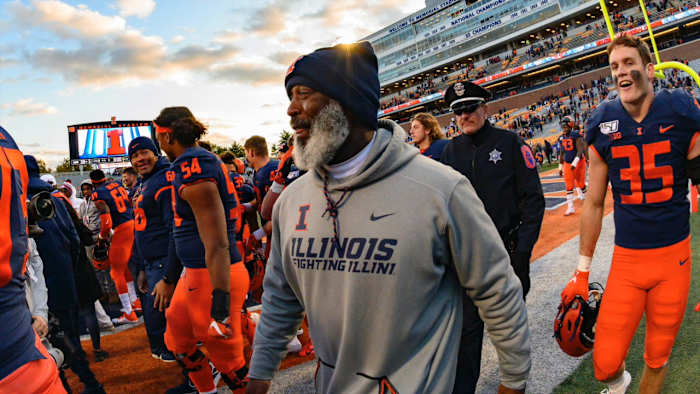Hello, Atlanta: How Illini Football Recruiting Is Breaking Into A New Talent Market
CHAMPAIGN, Ill. -- After Jimmy Lindsey earned his first full-time assistant job and was handed the task of recruiting the city of Atlanta, he had a big problem.
“I can tell you from day one I didn’t know where I was going and I didn’t know how to get around anywhere,” Lindsey said on Feb. 4. “This is before GPS made everything easier and I probably got lost five times and I probably drove past high schools six or seven times in my car before I realized the building is right here so let me just pull in here.”
While this issue isn’t an uncommon occurrence for those unfamiliar (or even some long-time residents) with driving in the Atlanta area, 20 years after that first job with Football Championship Subdivision program Tennessee-Chattanooga, Lindsey clearly knows his way around the area now.
In the last two weeks, following the hiring of Lindsey in February as the new defensive ends coach at Illinois, the Illini have opened up a new marketplace of recruits for a program that a month ago was starving for verbal commitments to its 2021 class.
On April 1, Illinois had just one high school commitment in its 2021 class: three-star Texas quarterback Samari Collier. However, on May 20th, Illinois now has four verbal pledges including a pair from the Atlanta area in three-star defensive back/athlete Prince Green and three-star defensive end Sedarius McConnell.
During the beginning of the 20th century, one of the nicknames for the emerging city known as Atlanta was “the Chicago of the South”. As the calendar flips to spring 2020, the Illinois football program is hoping to bring an old label out of retirement to help bring life into its recruiting efforts by finding talent in the Atlanta area.

For the first time since taking over the job in 2016, Lovie Smith and his Illinois football coaching staff have quickly turned its attention to the Atlanta area for recruiting help.
Patrick Gorski-USA TODAY Sports
Lindsey said on Feb. 4, in his first and only media conference since being hired, he wanted to “be able to walk into any Atlanta-are high school with the ‘block I’ logo on my shirt and have that mean something” and early returns are solid. Green is seen as a potential difference-maker in Lovie Smith’s defensive backfield and a potential two-way player as an upperclassmen. McConnell was a late offer by Illinois that is seen as a physical defensive end prospect, who is already listed at 262 pounds and will likely get bigger once he’s able to get a weight training plan together with Illini football strength coach Lou Hernandez.
The Illinois recruiting plan under Smith has been scattered across Florida, Texas and St. Louis to overcome its massive struggles in securing in-state talent but Georgia has never historically been a staple in the Illini’s plan of action. Going into the 2019 season, the Illinois football program had only produced 12 letterwinners from the state of Georgia and none from a Georgia high school program since 1980.
“To me it’s all about relationships and, since everybody says that, what I mean by that is building off the initial response you get when you walk into a school with that ‘block I’ (logo) and the first thing they say is that’s Lovie Smith’s school,” Lindsey said. “You’d be just amazed how well-known and popular Lovie is in the southeast region of this country and particular in a market like Atlanta.”
The racial component can’t be underestimated when the instant comfortability is explained about the recruiting momentum for Illinois football in Atlanta. According to the latest data compiled by the U.S. Census Bureau, Atlanta has 252,000 African American residents (50.7 percent) and 23,000 Hispanic or Latino residents (4.61%). So, while the rest of college football’s opportunity/hiring numbers continue to dwindle for black or Hispanic race coaches, Smith’s staff is defined by the opposite ideal. Smith is just one of 11 African-American head coaches among the 60 Power Five Conference schools and of his 10 on-field assistants, seven are black. Therefore, Smith’s Illini program can go into living rooms and high school coaching offices and likely guarantee that a recruit will have his position coach, defensive coordinator and head coach be a man of color and a man who understands and appreciates his personal and family’s cultural background. Hernandez is the only Hispanic-American strength and conditioning coordinator among 130 Football Bowl Subdivision programs.
“Sometimes in some places, for whatever reason, you don’t see a lot of men of color on coaching staffs,” Smith said. “It’s kind of hard to understand a little bit how people think men of color can’t lead men of color. And do it well. There’s diversity in our building.”
The other Illini coaching hire on Feb. 4, who will share the defensive line tutorial duties and has combined with Lindsey to generate instant southern appeal with Illini recruiting, was defensive tackle coach Alfred Davis. Davis, a native of College Park, Ga., said on the announced day of his hire that he’d “been recruiting Atlanta for the past six years” and felt confident that he can get visits with coaches, parents and recruits in the Memphis and Louisiana markets as well.
“I’m extremely confident we can make noise in the south because number one, as a recruiter you have to believe in yourself before anybody else does,” Davis said on Feb. 4. “Number two is you got to be able to point out the right type of talent for your program. I think it’ll be easier than you think because we have a name and a label people already know. They know who Lovie Smith is and they know we’re a Power Five Conference program. From there, it’s on us to get down south to shake hands, rub elbows and identify yourself with those coaches, those parents and those recruits.”